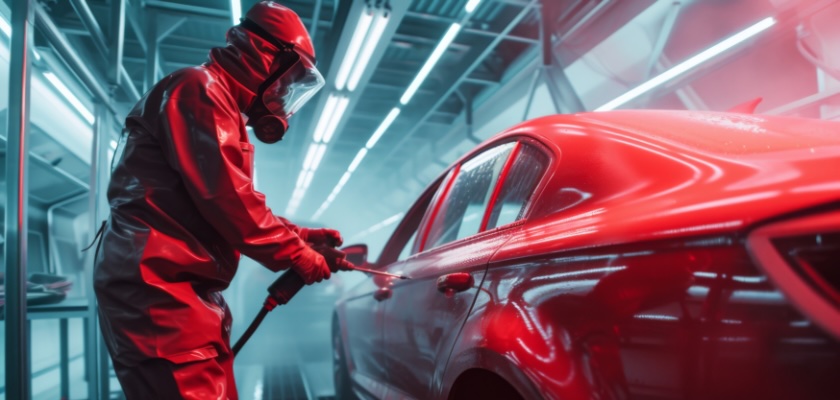
Ghana, West Africa’s second most populous country after Nigeria, has catalyzed growth in its automotive industry with a new investment policy now credited for driving the increase in the establishment of new vehicle assembling plants, with the potential to trigger high demand for vehicle paints and coatings solutions.
The number of international original equipment manufacturers (OEMs), local assemblers, and distributors has been on the increase in the last five years, driven largely by Ghana’s 2019 Automotive Development Policy (ADP), which has come with several incentives to woo private investors into the country’s fast-growing automotive market. The market is currently valued at more than
US$4 billion.
This growth is expected to open more production and supply opportunities for paint and coatings companies, with the potential to expand the automotive industry’s demand for products that not only enable automotive industry players to compete on color and aesthetics but also the capacity to mitigate against metal corrosion.
The government-driven ADP, which is credited for driving the surge in investments in Ghana’s automotive industry, says a previous official statement “is to attract major OEMs to invest in vehicle assembly plants, rapidly increase production sales volumes to create the economies of scale needed to develop a fully integrated automotive industrial hub in Ghana – vehicle assembly and local manufacturing of components and parts.”
ADP targets companies with the potential to invest in assembling new passenger cars, SUVs and light commercial vehicles such as pick-ups, mini-buses and cargo vans that would ultimately drive up demand not only for a variety of OEM and refinish coatings but also for technology that reduces the adverse effects of these products on the environment.
Automotive companies interested in Ghana’s vehicle market can now benefit from a corporate tax holiday for five to 10 years, 65% tariff differentiation for imported and local assembly, 0% import duties for plant, machinery, and equipment and value-based refunds.
Several global OEMs have in the last few years stepped up their investments in Ghana’s automotive industry, including Volkswagen, Toyota, Suzuki, Nissan, Peugeot, KIA, Hyundai, Changan, Foton, Kantanka, ZX Auto, Honda, Ashok Leyland, and Great Wall Motors.
Some of these OEMs are selling their vehicles directly to Ghanaian consumers while others have recently struck deals with local automotive companies for the distribution of their products at a time when there is growing awareness among consumers of the importance of environmental sustainability, hence the surge in demand and supply of electric cars as well as increasing use of eco-friendly interior, external and metal coatings.
The appetite to grow investments in vehicle assembling in Ghana is also being driven by the government policy to restrict importation of vehicles older than 10 years.
For instance, Toyota Motor Corporation is among the international OEMs that has opened more than one vehicle assembly plants in Ghana, while Nissan Motor Co. Ltd. has in the recent past unveiled a state-of-the-art assembly plant with a capacity of 31,000 vehicles every year.
For Nissan Motor Ltd., the investment in Ghana and the opening of the new assembling plant that it says is “the most modern, most state-of-the-art plant anywhere in West Africa” preceded the automotive company’s announcement of a new type of car paint “that uses metamaterials to reflect sunlight and reduce heat absorption.”
Nissan says the product, which is still in the testing phase but with promising initial tests, “could lead to cooler cabins in the summer and less energy usage from air conditioning.”
During the trials of the new materials, cars coated with the new material “had a 12°C (21.6°F) cooler exterior surface temperature and a 5°C (9°F) cooler interior temperature compared to a car with traditional paint.”
This new car coating material, which is expected to be distributed through Nissan’s affiliate in Ghana when fully commercialized, works by two types of tiny particles, one that reflects near-infrared rays from sunlight, which normally cause heat buildup in traditional paint, and the other that creates electromagnetic waves that counteract the sun’s rays and redirect the energy away from the car, according to Nissan.
“One of the challenges of developing this paint for cars is that it needs to be thin enough to be sprayed on with a spray gun and meet Nissan’s quality standards,” the company says in a recent statement on the innovative paint.
Nissan adds, “If development continues to go well, Nissan hopes to eventually offer this paint as a special option for cars and light commercial vehicles.”
The company says that “Ghana today stands as a benchmark for the African automotive industry, an example of what can be done when there is a will and a vision.”
Meanwhile, Chinese electric vehicle maker ROZ 01 previously signed a vehicle distribution agreement with Ronor Motors Ghana Ltd., a pioneering indigenous automotive company. The agreement makes Ronor Motors the sole agent for ROX 01 vehicles, a mid-to-large-sized SUV, in Ghana and West Africa.
Despite the high electricity costs in Ghana that keeps at bay would-be electric vehicle consumers, both the government and private sector are pushing for investment in the development of charging infrastructure and promoting uptake of electric vehicles across this country of 35 million people.
A good example is Kantanka Automobile, a Ghanaian automobile manufacturer, which assembles vehicles from knock-down kits and sells on and off-road vehicles. In the recent past, Kantanka announced plans to develop an all-electric city vehicle to be assembled in Ghana.

Standing to reap from this expansion of Ghana’s automotive market are several global and domestic paint and coating firms that supply e-coats, primers, basecoats, and clearcoats.
Ghana’s coatings and paints market is dominated by products from PPG Industries, AkzoNobel, Plascon, BBC Industrials, Neuce Ghana Paints, Inesfly Africa Ltd., CHIC, Suvinil Paints Ghana, Cresta Paint Industries Ltd., Bamson Co Ltd., Express Inter Africa Ltd., and Macro Polymers Ltd.
These firms distribute their products directly or through dealers. Retailers also use online and digital marketing with a notable growing interest in eco-friendly and durable coatings.
For AkzoNobel, which is a leading provider of diverse products for vehicle refinishes, the Ghana market is catered for by Dulux Ghana, a company that also covers the markets of Togo and Burkina Faso.
Meanwhile, demand for automotive paints and coatings in Ghana is also likely to be impacted by the increasing pressure on the government to regulate the importation of used vehicles that account for nearly 90% of the approximately 100,000 vehicles brought into the country every year, partly because the new cars are slightly more expensive than the used ones. This could mean increased demand for refinish coatings compared to OEM coatings.
Ghana’s Automotive Development Policy appears to remain the key driver in the growth of demand for the country’s automotive coatings, especially passenger and hybrid vehicle paints, with their consumption expected to be influenced by Ghana’s drive to achieve its own target to cut emissions by 64 MtCO2e by 2030.